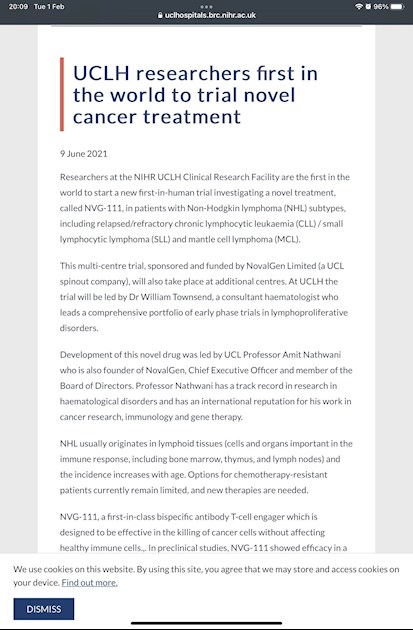Bispecific antibodies are one of the newest treatments currently being trialled and offer the promise of a new type of treatment but it’s not without risks. A paper in Blood as long ago as 2017 indicated that this could be a treatment for CLL patients.
NVG-111 is a humanised, tandem ROR1 and anti CD3 bispecific antibody previously shown to produce potent killing of tumour cells in both vitro and in vivo by engaging a membrane-proximal epitope in a domain of ROR1 and directing T cell activity via the CD3 to kill the CLL cells. ROR1 (Receptor tyrosine kinase-like Orphan Receptor 1) is a type I transmembrane protein and highly expressed on an array of haematological including CLL.
NVG-111 has now progressed to a Phase 1/2 first-in-human study in patients with debulked, relapsed/refractory CLL (and mantle cell lymphoma) with the drug given as add-on to ≥2nd line therapy with a BTK inhibitor or venetoclax. So far, only a handful of patients in the world (around six) have received this treatment as the ‘first in human’ phase 1 study has just started in London. These first few patients are pioneers who are testing the safety and efficacy of various doses of this treatment and we should be grateful to them for paving the way for others.
Side effects fall into the known and unknown groups. Known are tumour lysis syndrome (TLS), infection, sepsis, cytokine Release syndrome (CRS) and, possibly the most dangerous and unpredictable is immune effector cell-associated neurotoxicity syndrome (ICANS).
Cytokine release syndrome is caused by a large, rapid release of cytokines, interleukin-6 (IL-6), into the blood from immune cells that serve as a driver for host immune dysregulation. Signs and symptoms of cytokine release syndrome include fever, nausea, headache, rash, rapid heartbeat, low blood pressure, and trouble breathing. Treatment for severe CRS is primarily tocilizumab which is used for covid patients and those receiving CAR-T to dampen the process. Of course Tociizumab has its own side effects which need to be considered.
As a direct anti-cytokine drug, tocilizumab has been a cornerstone in the treatment of CAR-T-associated CRS because of its ability to dampen CRS without compromising T-cell function. However, the optimal timing of its administration is yet unknown.
Another significant toxicity is immune effector cell-associated neurotoxicity syndrome (ICANS). Unlike CRS, the underlying pathophysiology of ICANS remains somewhat unclear. Recent studies are in support of a model whereby CAR-associated T-cell stimulation induces central nervous system (CNS) endothelial cell (EC) activation as an early event, initiating a cascade of coagulopathy and enhanced endothelial permeability, resulting in a breakdown of blood–brain barrier. High levels of inflammatory cytokines such as monocyte-derived IL-1 and IL-6 and CAR-T-cells then enter the CNS and initiate a feed-forward loop of continued EC and pericyte activation. As a result, common ICANS symptoms include headache, delirium, language disturbance, seizures, focal deficits, and diminished consciousness including coma. In severe cases, patients can develop cerebral oedema and necrosis associated with intravascular microthrombi. Despite such grave symptoms, limited therapeutic interventions are available, and management is primarily supportive. Unfortunately, targeting of IL-6R using tocilizumab has not been shown to be effective for either prevention or treatment of neurotoxicity.
None of this is possible without functional T cells and, as we know, many CLL patients have poorly functioning, so called exhausted, T cells. Prior and concurrent treatment with a BTKi is thought to improve their function and the efficacy of bi-specific antibody treatment. Importantly, bi-specific antibodies are helpful for patients who are losing their response to a BTKi.
Bi-specific antibodies have been described as an ‘off the shelf’ type of CAR-T treatment which has the potential to be more accessible to a wider group of CLL patients because more readily availability and cost. If the more serious side effects such as ICANS can be mitigated whilst maintaining efficacy it has lots of promise.
Further reading and a few references here:
ascopubs.org/doi/abs/10.120...
youtube.com/watch?v=z9eRPEx...
ncbi.nlm.nih.gov/pmc/articl...
youtube.com/watch?v=bin-YvA...
Jackie

